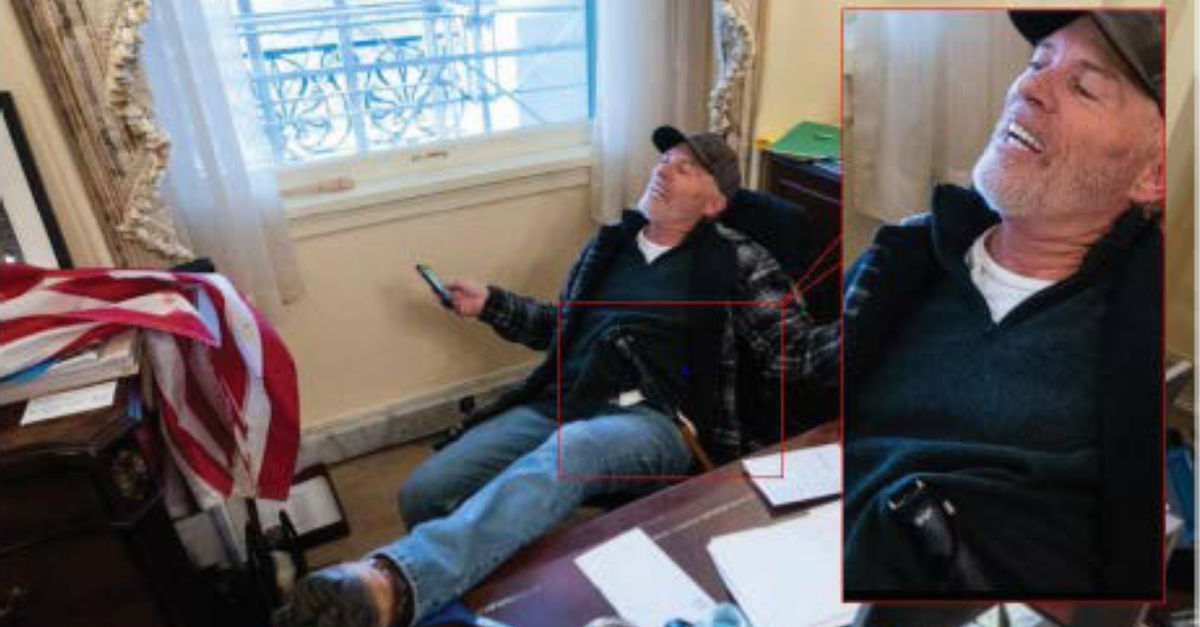
Richard Barnett, who kicked up his feet on a desk in Speaker Pelosi’s office, was photographed with what prosecutors allege was a stun gun.
One of the most notorious figures to emerge from the Jan. 6 Capitol attack has rejected a plea offer from the government, choosing instead to proceed to trial.
Richard “Bigo” Barnett became one of the faces of the incursion at the Capitol when he was pictured sitting in the office of House Speaker Nancy Pelosi (D) with one boot-clad foot resting firmly on her desk.
He allegedly took an envelope from her desk but left behind a quarter. He left behind a note that he says definitely didn’t contain a sexist slur. According to prosecutors, he had a stun gun with him the whole time.
He also complained about being locked up in pretrial detention after his arrest, and although he has since been released, he may not be done serving time just yet.
On Tuesday, Barnett’s lawyer Joseph McBride told U.S. District Judge Christopher Cooper that his client has rejected an offer from the government to plead guilty to a federal obstruction charge in exchange for dropping all the other charges against him, including theft of government property and disorderly conduct in a restricted building with a deadly or dangerous weapon. The obstruction charge carries a potential 20-year prison sentence, while the weapon charge is punishable by up to 10 years.
Barnett is also charged with a handful of misdemeanors.
After Assistant U.S. Attorney Mary Dohrmann told Cooper about the government’s offer, including a provision that the sentencing guidelines would apply, McBride explained why his client rejected the deal.
McBride said that the sentencing guidelines would result in a prison term of 70 to 87 months, or just under six years to more than seven years.
“We’re talking about a 61-year-old man,” McBride said, adding that his client wasn’t violent “by any stretch of the imagination.”
Calling the offer “not reasonable,” McBride said that “it’s not something we could in good faith live with or be willing to accept.”
“Of course we are rejecting the offer,” he added.
Cooper noted that it’s not his role as a judge to get involved in plea negotiations, and said that he would proceed as the parties wished.
“It’s six of one, half dozen of the other for me,” he said. “I’d be happy to take a plea, I’d be happy to give you a fair trial.”
McBride also said there was an “issue” with some of the charges against his client and hinted that he would be challenging the obstruction charge.
Several Jan. 6 defendants have already sought to dismiss that same charge, arguing that the applicable statute doesn’t cover the kind of behavior of which the defendants are accused. At least 10 judges in the D.C. district have rejected these efforts, although one has granted such a motion—a decision that appears to have given the dismissal efforts renewed energy.
Cooper appeared to signal his inclination to reject a motion to dismiss the obstruction charge, reminding McBride that he was one of the judges who believe the statute applies.
“I’m sure you know, Mr. McBride, I have decided that at least on the 1512 motion, I’m one of the judges who weighed in,” Cooper said.
Barnett’s trial is scheduled to start on Sept. 6.
[Image via DOJ.]
Have a tip we should know? [email protected]